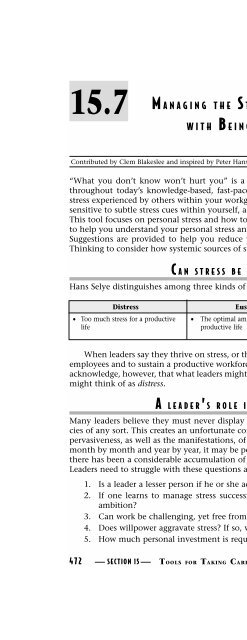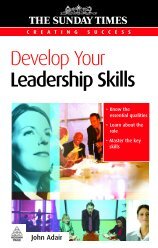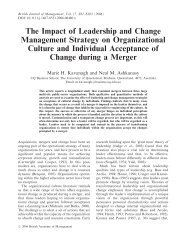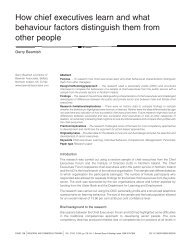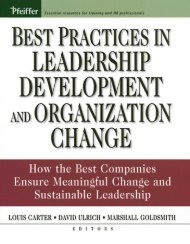- Page 4:
Copyright © 2001 by McGraw-Hill. A
- Page 14:
➠ 8.4 Levels of Communicating: De
- Page 18:
➠ 13.9 Human Capital: Truly the M
- Page 22:
1.10 The GAS model: Designing pract
- Page 26:
S ECTION 5—TOOLS FOR L EADING C H
- Page 30:
7.8 Affinity diagrams: Organizing m
- Page 34:
10.9 Making information visible 323
- Page 38:
13.8 Job Competencies: Measuring an
- Page 42:
HOW TO USE AND BENEFITFROM THIS BOO
- Page 46:
locate and use the exact tool for y
- Page 50:
If your need is:Look for these reso
- Page 54:
The Leadership GurusJohnson, BarryJ
- Page 58:
ACKNOWLEDGMENTSA book is never the
- Page 62:
1.1L EADERSHIP IN THE T WENTY-FIRST
- Page 66:
Information[☛ 2.2 7S Model]Leader
- Page 70:
H OW TO USE THIS LEADERSHIP TOOL“
- Page 74:
1.3H OW E FFECTIVE L EADERS A CT: A
- Page 78:
F OUR STEPS TO IMPROVING YOUR LEADE
- Page 82:
Challenge and support,but don’t p
- Page 86:
R ELATED LEADERSHIP TOOLS1.5 Seven
- Page 90:
Fosterinterdependence.(Think win-wi
- Page 94:
1.6 L EADERSHIP: THE B OARDS OF P L
- Page 98:
2. Are you satisfied with leadershi
- Page 102:
Leadership starts at the top, be th
- Page 106:
4. Follow through by holding leader
- Page 110:
R ECURSIVE M AXIM #1The best way to
- Page 114:
WEB WORKSHEETTake a few minutes to
- Page 118:
Work designWhat challenged theparad
- Page 122:
R ELATED LEADERSHIP TOOLS1.1 Twenty
- Page 126:
development paths of all positions
- Page 130:
1.11I NTEGRITY: GUT-LEVEL E THICSCo
- Page 134:
What actions will you take to begin
- Page 138:
2.1 I NTRODUCTION TO S YSTEMST HINK
- Page 142:
H OW TO USE THIS LEADERSHIP TOOL“
- Page 146:
4. As above, examine the subsystems
- Page 150:
This graphical illustration of a mi
- Page 154:
2.3 D IRECTIONAL S TATEMENTS:T HREE
- Page 158:
➌➍Next, have the group come tog
- Page 162:
H OW DOES A VISION STATEMENT FIT WI
- Page 166:
R ELATED LEADERSHIP TOOLS1.10 The G
- Page 170:
Step ➌Communicatingand modelingva
- Page 174:
The values you currently practiceTo
- Page 178:
N ESTEDPURPOSESA specific purpose k
- Page 182:
2.7 W RITING C LEAR G OAL S TATEMEN
- Page 186:
GoalKeyActionItemsGoal #2IntentGoal
- Page 190:
Internal Process MeasuresEmployee a
- Page 194:
3TOOLS FOR STRATEGICTHINKINGWith th
- Page 198:
Michael Traceyand FredWiersmaJames
- Page 202:
Mintzberg, Henry. The Rise and Fall
- Page 206:
their product or service no longer
- Page 210:
3.3 SWOT: STRENGTHS, WEAKNESSES,O P
- Page 214:
strategy clarification. Having said
- Page 218:
Designing the Value ConstellationTh
- Page 222:
3.5 S TRATEGIC R ESOURCING: DEFININ
- Page 226:
High Value-Added or Business Necess
- Page 230:
3.6S TRATEGIC R ELATIONSHIPS: ANALY
- Page 234:
I NCREASING V ALUE-ADDED W ORKNeces
- Page 238:
AppropriateorganizationalcultureApp
- Page 242:
3.8P ARTNERING FOR S UCCESS: JOINT
- Page 246:
StrategicYour proposeddimension Key
- Page 250:
3.9M ARKETING A P ROFESSIONAL S ERV
- Page 254:
G ETTING THE PROCESS STARTEDAs a wa
- Page 258:
4TOOLS FOR DESIGNINGPRODUCTIVE PROC
- Page 262:
A N ORGANIZATIONAL DESIGN MODELAll
- Page 266:
WEB WORKSHEETWho You ServeThe Exter
- Page 270:
Mid-level leaderFrontline leaderSen
- Page 274:
4.3 B USINESS P ROCESS R EENGINEERI
- Page 278:
❑❑❑❑Form a steeringcommitte
- Page 282:
4.4 E MPLOYEE I NVOLVEMENT:A RANGE
- Page 286:
The guideline What to look for Rema
- Page 290:
1. What is the probable level of in
- Page 294:
➠➠➠➠thrive; inappropriate a
- Page 298:
Need to Start Need to Stop Need to
- Page 302:
In Jack Stack’s Springfield Reman
- Page 306:
WEB WORKSHEETLeadershipAction plans
- Page 310:
4.7J OB S ATISFACTION: INVOLVING W
- Page 314:
5. Meaningful work• Your work has
- Page 318:
3. Clarify limitations on the CEO
- Page 322:
4.9U SING P ROFESSIONAL E XPERTISE:
- Page 326:
❑ What concerns do you each have
- Page 330:
Act on survey results and changes p
- Page 334:
Questionnaire designWhat elements o
- Page 338:
5.1L EADING C HANGE: A CHANGE E QUA
- Page 342:
5.2 L EADING M A JOR C HANGE IN Y O
- Page 346:
R ELATED LEADERSHIP TOOLS5.1 Change
- Page 350:
➢➢➢If the Readiness Index is
- Page 354:
H OW TO USE THIS LEADERSHIP TOOL“
- Page 358:
5.5C HANGE W INDOW: A BALANCED A PP
- Page 362:
1. On balance, quadrants ➊ and
- Page 366:
Past experience in your organizatio
- Page 370:
5.7S T AKEHOLDER G ROUPS: UNDERSTAN
- Page 374:
H OW TO USE THIS LEADERSHIP TOOL“
- Page 378:
5.8H UMAN T RANSITIONS: HELPING P E
- Page 382:
Endings Turmoil period New beginnin
- Page 386:
1. Initially, treat the other peopl
- Page 390:
5.10 A PPRECIATIVE I NQUIRY:B UILDI
- Page 394:
• Explore the strengths and past
- Page 398:
6.1 T HE BS DETECTOR K IT:R ECOGNIZ
- Page 402:
❑❑❑If there’s a chain of ar
- Page 406:
A SSUMPTIONCertainMATRIXTriviaImpor
- Page 410:
6.3 S ORTING O UT C OMPLEX S ITUATI
- Page 414:
WEB WORKSHEETBrainstorm and list th
- Page 418:
D ANGER!—CAVEATIn cases in which
- Page 422:
R ELATED LEADERSHIP TOOLS6.3 Comple
- Page 426:
H INTS• This tool is easy to use
- Page 430:
6.6O PTIMIZING Y OUR T HINKING—A
- Page 434:
Green(creative, newideas)[☛ 6.7 C
- Page 438:
Using MetaphorsBlue-Skying/No Const
- Page 442:
How skilled are you as a changelead
- Page 446:
P ARTIAL EXAMPLE: LEADERSHIP DEVELO
- Page 450:
6.9B RAINSTORMING: GENERATING I DEA
- Page 454:
• Ask people to post their ideas
- Page 458:
7.1R EFRAMING: WORKING THE R EAL P
- Page 462:
H OW TO USE THIS LEADERSHIP TOOL“
- Page 466:
7.2 A GENERAL P ROBLEM-S OLVINGM OD
- Page 470:
❑❑Integrate with the workgroup
- Page 474:
Step ➌ Every problem leaves a dis
- Page 478:
WEB WORKSHEETF INDING C AUSE W ORKS
- Page 482:
7.4 P OLARITIES: DEALING WITHI NTRA
- Page 486:
P OLARITY M AP W ORKSHEETPole 1: Po
- Page 490:
➎ Assess the risks and the limita
- Page 494:
Assess risks and limitations for ea
- Page 498:
➍AssessRisk✔ For each potential
- Page 502:
R ELATED LEADERSHIP TOOLS6.2 Assump
- Page 506:
The QualityTool What it is and what
- Page 510:
✔✔✔✔✔Leaders need to be a
- Page 514:
P ROCESSSTEPSStep❶ Materials❷ D
- Page 518:
WEB WORKSHEETNow think of situation
- Page 522:
8.1P OWERFUL L EADERSHIP C ONVERSAT
- Page 526:
2. Information(gleaned from data)3.
- Page 530:
8.2 D IRECT L EADER- TO-EMPLOYEEC O
- Page 536:
8.3 T HE L EADER’ S R OLE INO RGA
- Page 540:
WEB WORKSHEETUse the template provi
- Page 544:
Dialogue is about thinking together
- Page 548:
8.5M ETACOMMUNICATING: TALKING ABOU
- Page 554:
8.6C OMMUNICATION 101: DEALING E FF
- Page 558:
WEB WORKSHEETList strengths that yo
- Page 562:
can speak, use the extra processing
- Page 566:
8.8 L ISTENING T ECHNIQUES: TACTICS
- Page 570:
R ELATED LEADERSHIP TOOLS8.1 Conver
- Page 574:
• Getting down to workimmediately
- Page 578:
8.10M EDIA R ELATIONS FOR L EADERSC
- Page 582:
The media tends to be thought of as
- Page 586:
9.1 L EADERSHIP V ERSATILITY:M ATCH
- Page 590:
5. If there is an inconsistency in
- Page 594:
One very popular situational leader
- Page 598:
R ELATED LEADERSHIP TOOLS4.7 Job Sa
- Page 602:
➟Step ❸Postdelegationfollow-thr
- Page 606:
9.4I NCREASING Y OUR I MPACT: UNDER
- Page 610:
What actions could you take if you
- Page 614:
3. INVENT NEW ALTERNATIVES TO FULFI
- Page 618:
R ELATED LEADERSHIP TOOLS1.6 Boards
- Page 622:
Step ❻PresentationClose➠ Summar
- Page 626:
9.7 S ELLING W HEEL: GETTING Y OURR
- Page 630:
WEB WORKSHEETG ETTING Y OUR R ECOMM
- Page 634:
In his best-seller, The Spin ® Sel
- Page 638:
Ferret out the benefits and value a
- Page 642:
in knowledge-based, fast-moving, cu
- Page 646:
9.10S UPPORT N ETWORKS: THE S ECRET
- Page 650:
Type of supportPeople who presently
- Page 654:
10.1 H IGH-PERFORMING T EAMS:O RGAN
- Page 658:
H OW TO USE THIS LEADERSHIP TOOL“
- Page 662:
Sources of increased team IQLearn f
- Page 666:
4. Commit to implementing one to th
- Page 670:
H OW TO USE THIS LEADERSHIP TOOL“
- Page 674:
10.4I NCLUSION, CONTROL, AND A FFEC
- Page 678:
R ELATED LEADERSHIP TOOLS8.1 Conver
- Page 682:
The need to deal with unresolved I
- Page 686:
10.6A SSESSING Y OUR G ROUP L EADER
- Page 690:
Group leadership development needsS
- Page 694:
H OW TO HANDLE PARTICIPATION IN A G
- Page 698:
10.8G ROUND R ULES: HELPING G ROUPS
- Page 702:
WEB WORKSHEETDevelop a few critical
- Page 706:
key words from a complex idea, and
- Page 710:
10.10C LOSURE: HELPING G ROUPS M AK
- Page 714:
A decision that will needto be made
- Page 718:
Method Best used when How toLogical
- Page 722:
10.12RASCI: A PLANNING T OOLFOR W O
- Page 726:
3. Decide on a format and complete
- Page 730:
11.1P ROCESS C YCLE: PLANNING E FFE
- Page 734:
➌ Steps(Brainstorm steps, thenput
- Page 738:
Typical functions of workgroup and
- Page 742:
11.3 M EETING C HECKLIST: FROMP LAN
- Page 746:
❑❑Evaluate the meeting to ensur
- Page 750:
R ELATED LEADERSHIP TOOLS11.1 Proce
- Page 754:
Recorder(scribe, minutetaker)Proces
- Page 758:
11.5 T HE C HAIRPERSON’ S R OLE:D
- Page 762:
Your unique duties as chairperson(h
- Page 766:
❑❑❑Consider placing agenda it
- Page 770:
11.7T HE C HAIRPERSON’ S O PENING
- Page 774:
Step ➌: Set the meeting boundarie
- Page 778:
❑❑❑Avoid writing minutes for
- Page 782:
12TOOLS FOR LEADINGRELATIONSHIPS“
- Page 786:
H OW USE THIS LEADERSHIP TOOL“Whe
- Page 790:
12.2B UILDING T RUST INTO W ORKINGR
- Page 794:
I am honest and forthright withpeop
- Page 798:
✘✘✘Triangulating damages rela
- Page 802:
12.4G IVING AND R ECEIVING F EEDBAC
- Page 806:
Improvements in how yougive feedbac
- Page 810:
- Confronting someone who has no ab
- Page 814:
12.6 T HE 5 CS : ESCALATINGC ONFRON
- Page 818:
➍Confront➎ConcludeCopyright McG
- Page 822:
Level ➌PersonalManagement ofthe C
- Page 826:
12.8D EALING WITH D IFFICULT P EOPL
- Page 830:
AggressorsKnow-It-AllsNegativistsSt
- Page 834:
Develop easy-touseservices.Make you
- Page 838:
13TOOLS FOR LEADINGPERFORMANCESucce
- Page 842:
➍Clarifyingwhat ispossible andset
- Page 846:
R ELATED LEADERSHIP TOOLS2.3 Direct
- Page 850:
End with goal achievement.✔ Coach
- Page 854:
No high-performers to coach? Perhap
- Page 858:
➎ Goal statements➏ Consequences
- Page 862:
13.4 M ANAGEMENT BY O BJECTIVESInsp
- Page 866:
Your design of an MBO-type processD
- Page 870:
13.5 U RGENCY AND I MPORTANCE:T HE
- Page 874:
WEB WORKSHEETImportantUrgentList ac
- Page 878:
If the personfailsThis person:• f
- Page 882:
13.7D OCUMENTING E MPLOYEE P ERFORM
- Page 886:
unless you can verify them. Ensure
- Page 890:
Underlyingcharacteristics Definitio
- Page 894:
13.9 H UMAN C APITAL: TRULY THEM OS
- Page 898:
4. Implementationof Changes5. Follo
- Page 902:
❑❑❑❑Not finding a coachor m
- Page 906:
13.11P ROFESSIONAL L EADERSHIP:D EL
- Page 910:
having a clear professional group s
- Page 914:
14.1 S CARCITY AND A BUNDANCE:T HE
- Page 918:
The situationA scarcity mind-setPot
- Page 922:
E XAMPLES OF SINGLE- AND DOUBLE- L
- Page 926:
14.3N E EDS A NALYSIS: MEASURING R
- Page 930:
✔✔✔✔Set goals and plan foll
- Page 934:
14.4 A DULT L EARNING: PRINCIPLESFO
- Page 938:
Adult learning principle: Adults ar
- Page 942:
❑❑❑Next, reverse roles and ha
- Page 946:
14.6 L EADERS AND L EARNING S TYLES
- Page 950: 3. When and how are these personal
- Page 954: Some Implications of Personal Prefe
- Page 958: 15TOOLS FOR TAKINGCARE OF YOURSELFS
- Page 962: 6. Manage stress more effectively.
- Page 966: 7. Dealing with damaging habits:Wha
- Page 970: Your inside or personal emotional c
- Page 974: R ELATED LEADERSHIP TOOLS1.5 Seven
- Page 978: The Bull in the China Shop. With a
- Page 982: 15.4U NDERSTANDING O UR A SSUMPTION
- Page 986: ➏ Act on conclusionsLooking back,
- Page 990: R ELATED LEADERSHIP TOOLS6.2 Assump
- Page 994: a deeply ingrained emotional basis,
- Page 998: 15.6M ANAGING Y OUR D EFENSIVE R EA
- Page 1004: S TRESS HAS BOTH FINANCIAL AND HUMA
- Page 1008: R ELATED LEADERSHIP TOOLS4.7 Job Sa
- Page 1012: Contingency leadership model, 267-2
- Page 1016: Quality, tools for ensuring, 199-23


